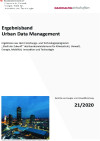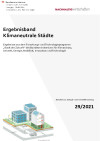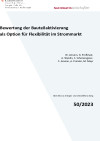Suchergebnisse
Alternativdämmstoffe aus modifizierten Lignozellulosefasern
Holz als Ausgangsprodukt für einen neuen Dämmstoff
International Passive House Summer School for Students (PH-SS)
Summer school / workshop for design, construction and calculation of buildings in the passive house standard for students from Austrian and European universities.
THERM-opti-BALCONY: Thermal Optimized Renovation of Balconies
Pre-cast cantilever balconies represent a particular problem in the thermal renovation of buildings. The central goal of this project is the development of practical and cost-effective mounting solutions for the thermally decoupled reconstruction of balconies on building frontages and achieving a significant increase in the energy performance of the thermal renovation measure.
"Alles Palette" - Entwicklung des Palettenhauses zur Serienreife
Das 2007 im EU-weiten Wettbewerb GAU:DI siegreiche Projekt "Palettenhaus" besteht aus 800 (gebrauchten) Paletten. Es war im Maßstab 1:1 bei der Biennale in Venedig 2008 ausgestellt und wurde im Projekt zur Serienreife entwickelt. Dafür wurden exemplarisch zwei Szenarien untersucht: die (temporäre) Bebauung des Flugfelds in Aspern und die Errichtung eines Low-cost Gebäudes in Südafrika.
BIGMODERN Subprojekt 2: Demonstrationsgebäude Amtshaus Bruck
Im Rahmen dieses Subprojekts wurde eine Entscheidungsmatrix sowie ein Planungshandbuch mit Machbarkeitsanalysen und Informationssammlungen, die als Entscheidungshilfe in den Planungs- und Ausführungsprozessen im Zuge nachhaltiger Gebäudemodernisierung dienen und so das Risiko bei der Anwendung neuer Technologien minimieren sollen.
Sunny Energy Building: ENERGYbase - Office building of tomorrow
Energybase is a showcase project in terms of energy efficiency and use of renewable energies realized by the Vienna business agency. With 7.500 sqm net floor area ENERGYbase provides space for innovative business and research and development on the field of green energy.
International Passive House Summer School for Students (PH-SS)
Summerschool / Workshop zum Entwerfen, Planen, Konstruieren und Berechnen von Gebäuden im Passivhaus-Standard für Studierende österreichischer und europäischer Hochschulen.
Ergebnisband „Urban Data Management“

Der vorliegende Ergebnisband stellt abgeschlossene Projekte aus dem Forschungs- und Technologieprogramm „Stadt der Zukunft“ des Bundesministeriums für Klimaschutz, Umwelt, Energie, Mobilität, Innovation und Technologie (BMK) im Bereich Urban Data Management vor. Die gewonnenen Erkenntnisse sollen eine Entwicklung in Richtung energieeffiziente und klimaverträgliche Stadt unterstützen, die auch dazu beiträgt, die Lebensqualität und die wirtschaftliche Standortattraktivität zu erhöhen.
Schriftenreihe
21/2020
Redaktionelle Gestaltung: Bianca Pfefferer, Hannes Warmuth (ÖGUT)
Herausgeber: BMK
Deutsch, 24 Seiten
Downloads zur Publikation
Einfamilienhaus und verdichtete Wohnformen - eine Motivenanalyse

Die Studie konzentriert sich auf die Darstellung der Gründe für die zögerliche Realisierung flächensparender, verdichteter Wohnformen einerseits und für die dominierende Bevorzugung des freistehenden Einfamilienhauses andererseits. Sie beschränkt sich jedoch nicht auf die Deskription der entscheidenden Motive für die jeweilige Wohnoption, sondern analysiert auch die Bestimmungsfaktoren und Rahmenbedingungen, unter denen die jeweiligen Motive entstehen bzw. entstanden sind. Auf der Basis dieser Analyse werden Alternativen vorgeschlagen und hinsichtlich ihrer Effektivität und Realisierungschancen evaluiert.
Ergebnisband „Klimaneutrale Städte"

Der vorliegende Ergebnisband stellt abgeschlossene Projekte aus dem Forschungs- und Technologieprogramm „Stadt der Zukunft“ des Bundesministeriums für Klimaschutz, Umwelt, Energie, Mobilität, Innovation und Technologie (BMK) im Bereich Klimaneutrale Städte vor. Die gewonnenen Erkenntnisse sollen eine Entwicklung in Richtung energieeffiziente und klimaverträgliche Stadt unterstützen, die auch dazu beiträgt, die Lebensqualität und die wirtschaftliche Standortattraktivität zu erhöhen.
Schriftenreihe
29/2021
Redaktionelle Gestaltung: Bianca Pfefferer, Hannes Warmuth (ÖGUT)
Herausgeber: BMK
Deutsch, 22 Seiten
Downloads zur Publikation
Gründerzeit with future - demonstration project 1: David´s Corner
High value energy efficient refurbishment of an ensemble of three neighbouring Wilhelminian style buildings in a non-lucrative location.
Bewertung der Bauteilaktivierung als Option für Flexibilität im Strommarkt

Um die Forschungsfrage dieser Studie nach dem zukünftigen Stellenwert der Bauteilaktivierung für die Energieversorgung zu beantworten, wurde ein Schätzmodell zum erwartbaren Neubau von Wohn- und Dienstleistungsbauten bis 2040 sowie der Sanierung von Bestandsbauten entwickelt.
Schriftenreihe
50/2023
W. Amann, G. Preßmair, A. Stipsits, S. Schoisengeier, C. Amann, A. Preisler, M. Mayr
Herausgeber: BMK
Deutsch, 75 Seiten
Downloads zur Publikation
e80^3 - Subprojekt 3: Technologie und Komponentenentwicklung
Das Hauptziel des Subprojektes 3 war die Technologie und Komponentenentwicklung von Prototypen für vorgefertigte Fassadenelemente und Ver- und Entsorgungssysteme. Besonders die hochbautechnischen und bauphysikalischen Aspekte wurden betrachtet und in die Überlegungen mit einbezogen.
Serial refurbishment for buildings in timber construction
Refurbishment of single- and two-familiy houses in timber construction in Austria has a large CO2-saving potential. To meet the special requirements for the refurbishment of timber constructions, a concept for the renovation to passive house respectively plus-energy house standard with special focus on ecologic construction materials was developed in this project.
Die Umweltchecker - Eine Ausstellung des ZOOM Kindermuseums
Zentrale Ergebnisse der Programmlinie "Haus der Zukunft" werden für die Zielgruppe Kinder und Jugendliche aufbereitet und im Rahmen einer Ausstellung im Zoom Kindermuseum präsentiert.
Wirtschaftliche Nutzung von Photovoltaik-Strom in Gebäuden
Ziel des Vorhabens ist die Optimierung der Direktnutzungsquote des erzeugten PV-Stroms im/am Gebäude. Dabei wird insbesondere die Fragestellung beantwortet, mit welcher Anlagendimensionierung eine möglichst optimale Direktnutzungsquote von PV-Strom unter wirtschaftlichen Gesichtspunkten erreicht werden kann. Als Ergebnis wird ein Berechnungsmodell entwickelt (inkl. Bericht), das für die Ermittlung der wirtschaftlich optimalen Direktnutzungsquote von PV-Strom für unterschiedliche Gebäude- und Nutzungstypen herangezogen werden kann.
OPEN HEAT GRID - Offene Wärmenetze in urbanen Hybridsystemen
Primäres Forschungsthema von OPEN HEAT GRID war die Untersuchung der Möglichkeiten zur Forcierung der Einspeisung industrieller Abwärme in bestehende Fernwärmenetze. Die Projektergebnisse zeigen, dass Abwärme nicht kostenlos ist: trotz minimaler variabler Kosten müssen sich die Investitionskosten in üblichen Amortisationszeiten rechnen. Die Analyse zeigt, dass es keiner staatlichen Regelung im Sinne einer Einspeiseverpflichtung oder Marktliberalisierung bedarf. Jedoch liegen aus ökonomischer Sicht Informationsasymmetrien vor, wodurch es möglich ist, dass rationale Entscheidungen nicht zustande kommen.
"1000 Passivehouses in Austria" - Passive house object databank

The first joint project of the four IG passive house organisations on behalf of the programme line "Building of Tomorrow" - an initiative of the Federal Ministry for Transport, Innovation and Technology - for the purpose of setting up a detailed network documentation of 80% of all passive houses in Austria.
MODESTORE - Modular High Energy Density Sorption Heat Storage

Seasonal storage of solar heat for use in low energy and passive houses (new buildings as well as old buildings).
Transfer initiative - The future belongs to the passive house

Developing the passive house standard from pilot projects to a common standard in housing projects with an optimum of comfort. Comprehensive transfer initiative of the passive house standard by fairs, exhibitions and lobbying activities in communities.
